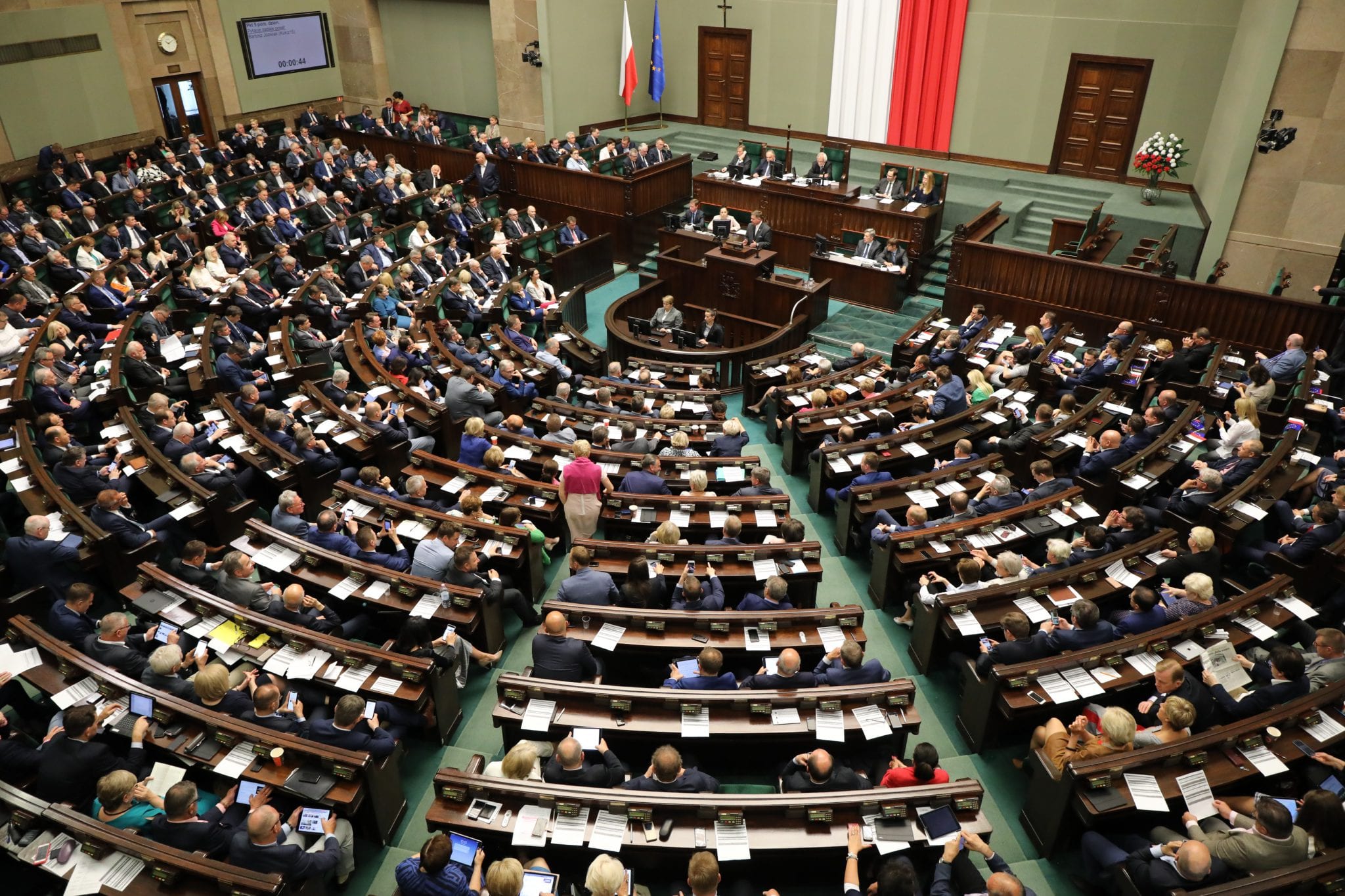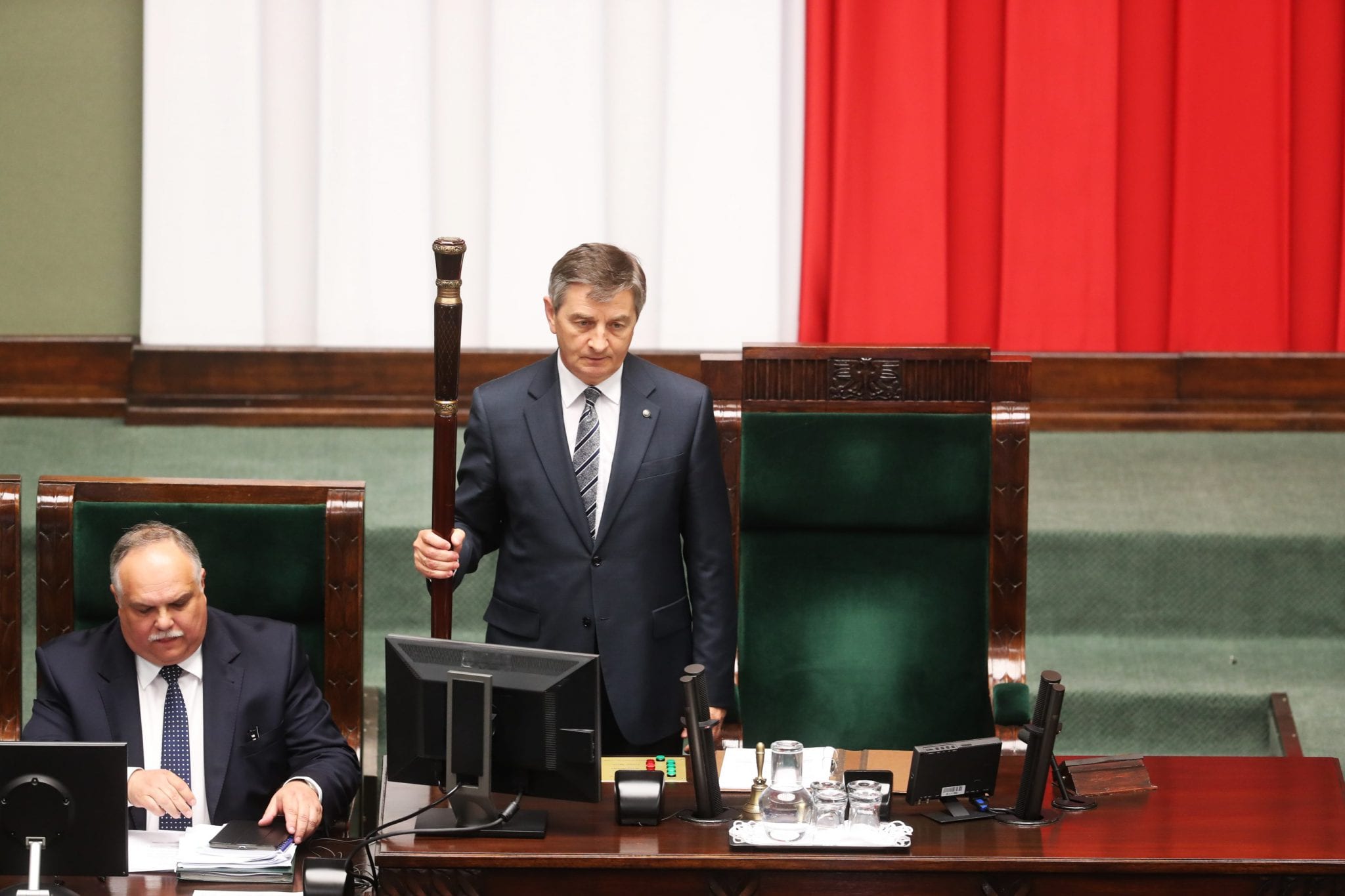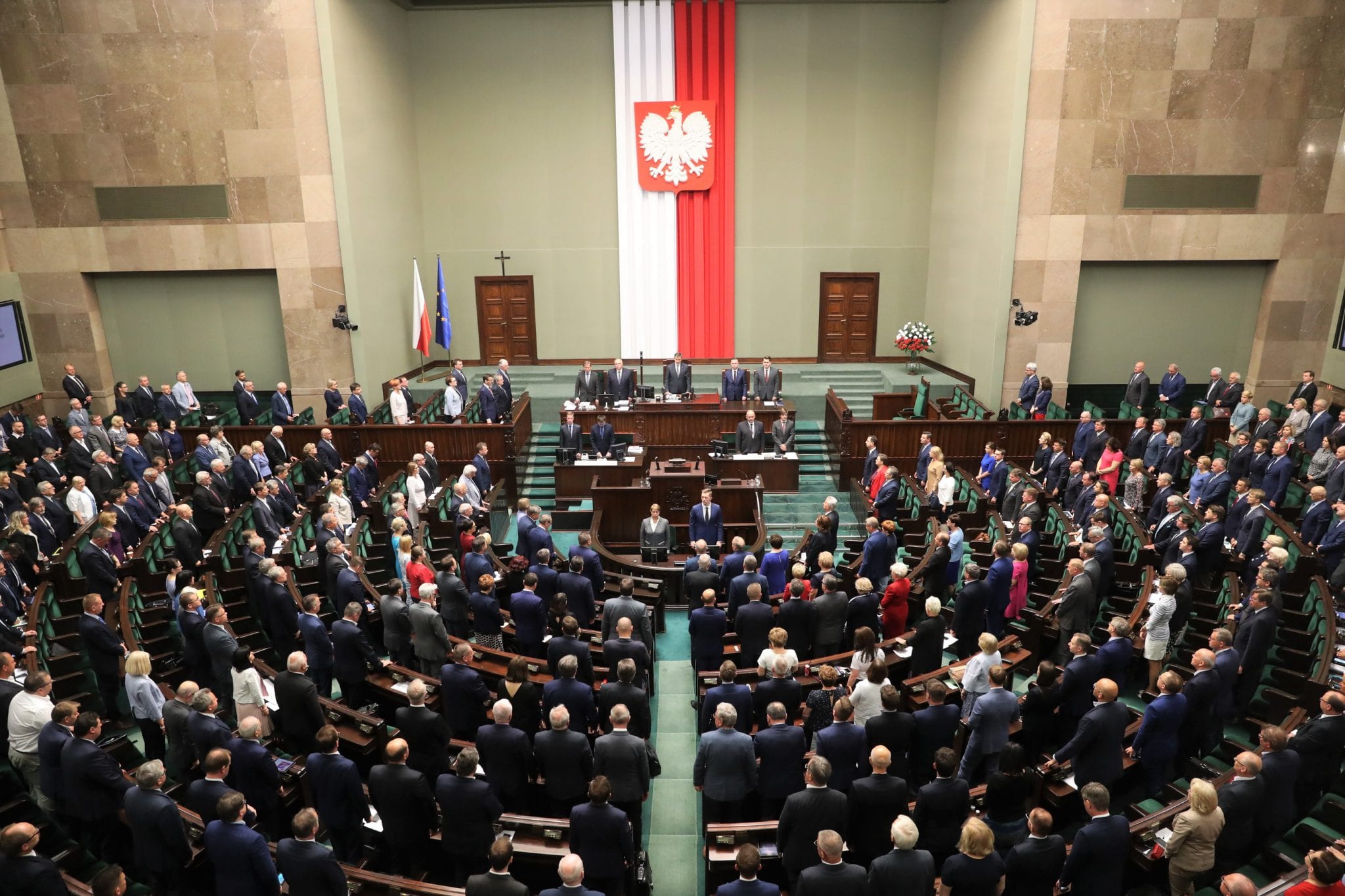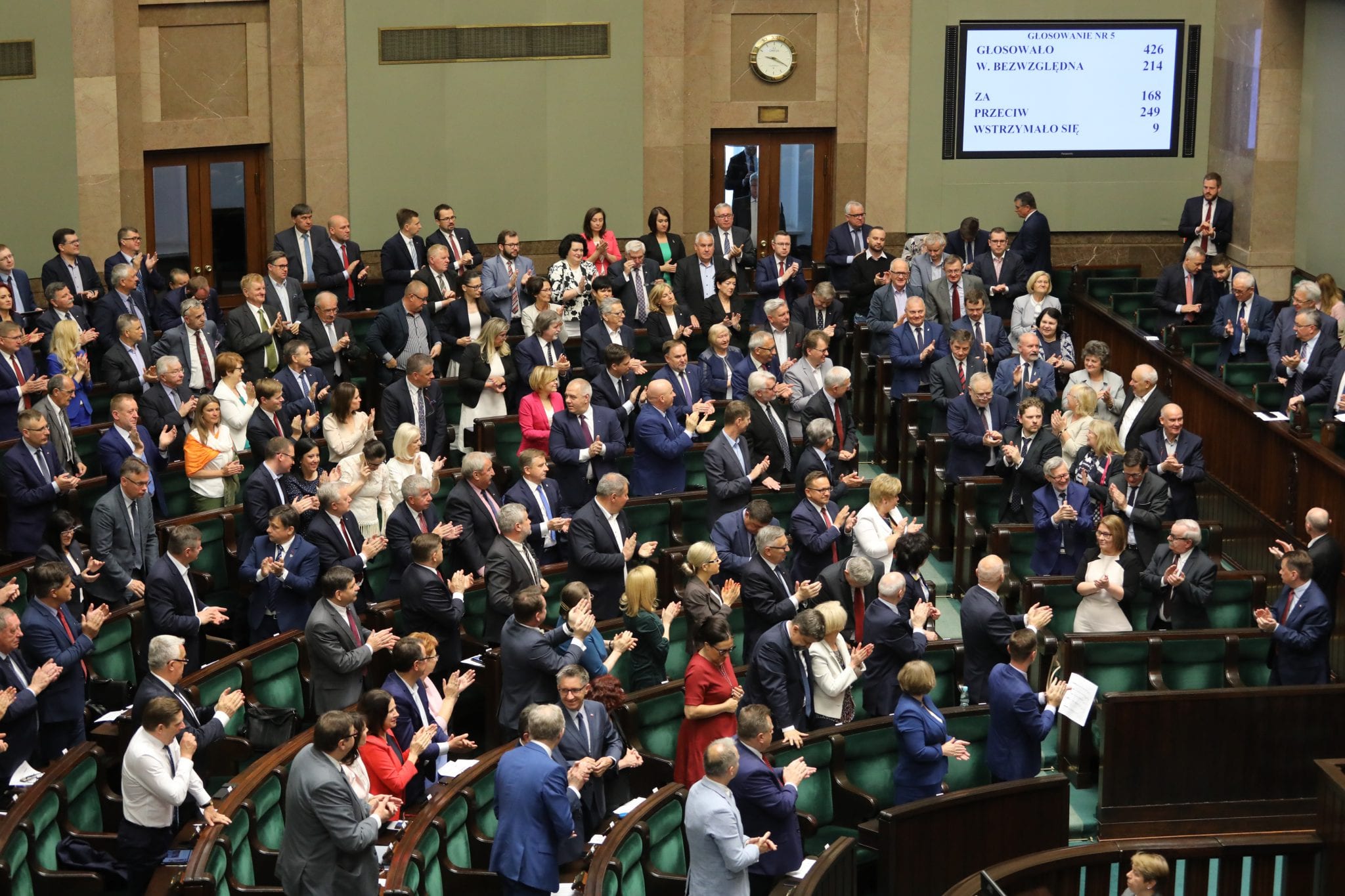Passing the law on the Central Transport Port and the law on supporting new investments, as well as amending the law on vocational and social rehabilitation and employment of persons with disabilities were the highlights of the third and final day of the 62nd session of the Sejm. The Sejm also amended the Law on the Exercise of the Mandate of Deputies and Senators reducing deputy and senatorial salaries by 20 percent. The next session is scheduled for 5-8 June 2018.
Laws passed by the Sejm. They will now be examined by the Senate
The Personal Data Protection Act will ensure better protection of personal data. The proposed regulations result from the need to ensure effective application in Poland of the EU Regulation on the protection of individuals with regard to the processing of personal data and on the free movement of such data (the so-called RODO). All entities that collect and process personal data will have to comply with the new regulations.
An amendment to the Supreme Court Act amends the provisions on extraordinary complaints and the procedure for appointing assessors. An extraordinary complaint against final judgments of Polish courts may only be submitted by the Prosecutor General or the Ombudsman. At present, it can be filed by eight entities, including the Prosecutor General, the Children's Rights Ombudsman, the Financial Ombudsman and the President of the Office of Competition and Consumer Protection. The amendment also introduces changes in the Law on the Common Court System regarding the appointment of court assessors. According to the proposal, this would be done not by the minister of justice, as is currently the case, but by the president. Under the proposed amendment, the National Council of the Judiciary will be able to object to a candidate for a position of assessor in the stage of the procedure preceding the president's appointment of the assessor.
Thanks to amendments to the Act on Driving Vehicles, a person applying for a driving license and a permit to drive a streetcar will face real legal consequences in case of making an untrue statement. According to the Supreme Court decision, the current provisions of the Act on driving licenses do not authorize the administrative body to collect statements from applicants for driving licenses under pain of criminal liability for providing false information about being subject to a driving ban.
The amendment to the Act on cash benefits from social insurance in case of sickness and maternity and some other acts extends until November 30, 2018 the possibility of issuing both electronic (e-exemptions) and paper (ZUS ZLA form) certificates of temporary inability to work. Current regulations require that all sick leave be issued electronically (moving away from paper) from 1 July 2018. Electronic medical certificates of temporary inability to work due to illness, hospital stay or the need to take care of a sick family member, constituting evidence when determining the right to benefits and the amount, can be issued from 1 January 2016. It has also been allowed to use two forms of medical certificates simultaneously: paper and electronic.
Amendments to the Act of 14 December 2016. - The Education Law clarifies the regulations concerning the participation of trade union representatives in the competition committee for the position of school director and the secrecy of votes of the pedagogical council when the vote concerns matters of persons holding managerial positions in the school.
The amendment to the Act on Occupational Pension Schemes implements an EU directive that aims to facilitate the exercise of the right to free movement of workers between EU countries by reducing the obstacles arising from certain rules on supplementary pension schemes linked to the employment relationship. This includes determining the maximum waiting period for acquiring the right to join a supplementary pension scheme and extending the information obligations of employers running occupational pension schemes towards their members. It also means transferring information by managers of occupational pension schemes to employers running them. The draft sets the maximum permissible waiting period for the acquisition of pension rights. The vesting period or the waiting period or both should not exceed three years for employees whose employment relationship terminates for reasons other than the acquisition of pension rights.
The amendment of the Act on Conformity Assessment System and the Act on Conformity Assessment and Market Surveillance Systems is aimed at adjusting national regulations to the regulations of the European Union in the scope of market surveillance system corrections. Poland has been obliged to establish sanction regulations for violations of the provisions of these regulations by economic entities.
The amendments to the PIT and CIT Acts are aimed at easing the solutions concerning the principles of taxation of fixed assets and intangible assets acquired by inheritance or donation. With respect to tangible and intangible assets acquired by inheritance, a return to the rules in force before 1 January 2018 is envisaged. However, in the case of tangible and intangible assets acquired by way of donation, the draft introduces the possibility to continue depreciation.
Amendment of the Act on insignia of the Polish Armed Forces introduces for the Territorial Defense Forces (WOT) the symbolism of the Polish Armed Forces - military eagle and flag of the type of armed forces. WOT symbolism will include the Fighting Poland symbol, which will emphasize the fact that the defense of the homeland is a matter and duty of all citizens of the Republic of Poland. This symbol of the Polish nation's struggle against the occupants refers to the heritage to which contemporary soldiers of the Territorial Defense Forces refer - to the heroes of the Polish Underground State and the Home Army, as well as the Soldiers of the Aged.
The amendments to the Law on Vocational and Social Rehabilitation and Employment of Persons with Disabilities relate to the implementation of the second stage of the Program of Comprehensive Support for Families "Za życiem", adopted by the Government in December 2016, whose primary task is to support families with persons with disabilities, especially those raising children with disabilities. The Act introduces the creation of support mechanisms for families in the area of support and rehabilitation services through the provision of club activities in occupational therapy workshops, the entitlement of persons with sickness insurance to a care allowance in case of illness of a disabled child up to the age of 18, the use of flexible forms of organization of working time, including telework.
The Act on supporting new investments introduces a mechanism of granting support to entrepreneurs in undertaking new investments in Poland. It will replace the current system operating in special economic zones (SEZ - currently there are 14 of them). In the new concept tax incentives will be available on the whole territory of Poland, on areas where business activity can be carried out.
The amendment to the Act on Exercising the Powers of Deputies and Senators fulfills a public announcement of Law and Justice president Jaroslaw Kaczynski that the salaries of parliamentarians would be reduced by 20 percent. After the entry into force of the amendment will be equal to 80 percent of this salary. The parliamentary allowance to cover expenses incurred in the exercise of the mandate in the territory of the country is to be equal to 25% of the undersecretary of state's remuneration. The proposed solutions are to come into force on the first day of the second month after the month in which the amendment was published in the Dziennik Ustaw.
The Act on collective management of copyright and related rights regulates comprehensively collective management of copyright and related rights in Poland. It defines new rules of functioning of collective management organisations in order to ensure their transparency and responsibility towards their members.
The Law on the Central Transport Port concerns the creation of a legal and organizational framework for the implementation of the CPK investment and the broadly understood accompanying investments that create a transport system based on the Port's central location, as well as other tasks. According to the resolution of the Council of Ministers of November 2017, the CPK is to be built in Stanislawow in the Baranow municipality near Grodzisk Mazowiecki. The construction of the new facility is necessary to replace Warsaw's Chopin Airport, which cannot serve as a large transfer port. The capacity of the Warsaw airport is running out due to the rapidly growing air traffic in the region (15.72 million passengers used the airport in 2017, 22 percent more than in 2016). The new airport, located between Łódź and Warsaw, is to be one of the largest transfer airports in Europe. After the first stage of construction it is to serve up to 45 million passengers a year, and eventually even approx. 100 million. The airport is to be built on about 3,000 hectares of land. By the end of 2019, preparatory works are to be carried out, and the airport itself is to be built for another 8 years, i.e. until the end of 2027.
II readings
In the draft resolution on the future shape of the cohesion policy in the European Union, the Sejm emphasizes that the cohesion policy is the key investment policy of the EU. It should constitute a significant part of the EU budget, covering all regions with its geographical scope. Appropriate support should be given to regions with the lowest level of development, and GDP per capita should remain the basic indicator for dividing up the allocation of cohesion policy funds.
The Sejm has completed its parliamentary work and has directed the following bills to be signed by the President
The amendment to the Act on payment services and certain other acts implements the EU directive on payment services (PSD2 Directive) in the Polish legal system. The new rules are to ensure greater transparency and consistency of law in the area of payment services. They will also serve as a basis for creation of a single payment market in the EU.
The primary objective of the amendment to the Act on the monitoring system of road transport of goods and certain other acts is to include in the monitoring system rail transport of so-called sensitive goods (engine fuels and their derivatives, including biodiesel; fuel additives; lubricating oils; de-icing agents based on ethyl alcohol; diluents and solvents; partially and fully denatured ethyl alcohol and dried tobacco).
The amendment to the Telecommunications Act and certain other acts is aimed at improving the functioning of the telecommunications market and clarifies the provisions concerning its participants. The new provisions are to ensure better consumer protection against unfair practices and abuses involving, among others, premium text messages.
The amendment to the Act on State Medical Rescue Services provides, among other things, for the Minister of Health to take over tasks related to the maintenance and technical operation of the Command Support System (CDS) of the State Medical Rescue Services (PRM), which has so far been performed by a competent minister for public administration.
Current information and questions on current issues
The Sejm took note of the Information on significant problems arising from the activity and jurisprudence of the Constitutional Tribunal in 2016 together with the position of the Commission. The information was presented by the President of the Constitutional Tribunal Julia Przyłębska.
Other decisions of the Chamber
The Sejm has directed the bill on bio-components and liquid biofuels and certain other acts to the Committee for Energy and the State Treasury. The draft amendment of this act concerns the establishment of the Low Emission Transport Fund, the purpose of which is, inter alia, to finance the development of infrastructure enabling the use of alternative fuels, i.e. biocomponents, liquid biofuels, other renewable fuels, electricity, hydrogen, compressed natural gas (CNG) and liquefied natural gas (LNG) in transport, at the same time reducing the use of diesel oil and motor gasoline. The Sejm referred the bill to the Energy and Treasury Committee.






